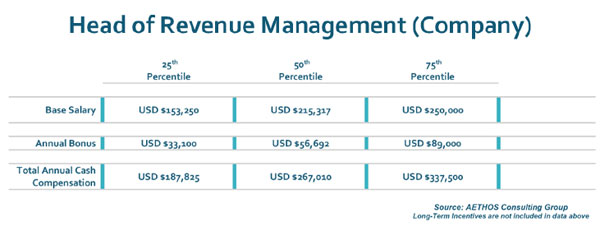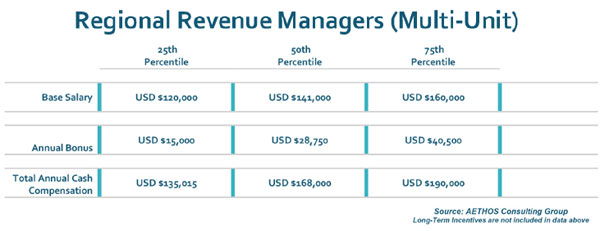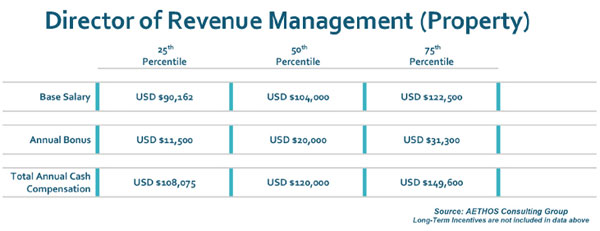✕

Column: industry Tag: Hotel revenue,revenue management,hotel industry Published: 2017-12-15 14:28 Source: Author:
REPORT FROM THE U.S.—Revenue management is an increasingly important field within the hotel industry, but some experts of the discipline believe the hotel industry doesn’t pay enough to lure the strategic and analytically minded talent needed to fill those positions.
New research from Aethos Consulting Group examines how revenue managers are compensated. The company’s study breaks down total compensation—including base salary and annual bonuses—at the 25th, 50th and 75th percentiles and further distinguishes between companywide heads of revenue management, regional revenue managers and property-level directors of revenue management.

David Mansbach, managing director at Aethos and primary author of the study, said the numbers show the hotel industry has “a disconnect at so many levels” when it comes to how revenue managers are paid.
“It’s one of the core competencies companies need to seriously look at and re-evaluate,” he said.
Mansbach described revenue management as one of “the two hardest competencies up and down the organizational chart” along with asset management, but he said other industries are “way ahead of the hotel industry” in terms of valuing people who have the skills to be successful revenue managers.
“Companies (within the hotel industry) are stalled when it comes to bringing on exceptional talent,” he said. “Bigger companies have banding issues, and smaller companies outside of a few don’t see the value of bringing in these types of people.”

Mansbach elaborated on the issues larger companies face, saying many aren’t changing their pay to avoid “creating complex compensation environments.”
He said from his perspective it seems like 10% to 15% of hotel companies “really get it” when it comes to valuing revenue managers and how much a person with the right skillset can help to make a company more profitable.
“A client retained us a couple months ago and said, ‘We don’t care how much we have to pay this person. If they move (revenue per available room) up a dollar, we understand the ROI,’” he said. “More companies need to think like that.”

A growing field
Mansbach said large ownership concerns like real estate investment trusts are just now starting to wrap their minds around the value of revenue management.
Sloan Dean, SVP of revenue optimization and underwriting for Ashford Inc., agreed that the discipline is growing in stature and that does equate to some growth in pay.
“It used to be that the revenue manager was at a discount to the director of sales,” he said. “But now the director of revenue management and (the director of) sales make equivalent money. That was not the case five years ago.”
But the underlying issue of undercompensation still remains and prevents the hotel industry from acquiring the talent needed as the role evolves, Dean said.
“We’re still an industry that overpays operations leaders that are not necessarily the strategic thinkers we need,” he said. “Sometimes we undercompensate revenue managers, so we don’t get those best strategic minds. There’s still a ways to go in terms of pay, but there has been a lot of progress in the last decade. Compensation has increased significantly. I’m an example of that.”
As someone who came up in the industry within revenue managers, Dean said it wasn’t always clear what the career progression could or would be if you had high aspirations. But now higher-level executive positions exist to provide a career path for young revenue managers.
“Now I’m overseeing revenue and income for a large ownership entity and report to an executive committee member at a publicly traded company,” he said. “My role didn’t exist five years ago.”
But even with promises of career growth, the hotel industry still has to compete with other industries that might be more appealing to new college graduates with important skillsets. Dean believes that leaves a dearth of talent for many midlevel revenue-management positions.
“We’re losing minds to things like investment banking and consulting,” Dean said. “The kids with economics or finance degrees that don’t just come out of hospitality schools like Cornell, they have a quicker path to getting to $100,000 to $150,000 of income in those industries. It’s not that we’re losing people from within the industry, but we need to draw those behavioral economics minds from other industries.”
Kelly McGuire, SVP of revenue management and direct marketing at MGM Resorts International, said part of the problem is the industry’s homegrown revenue managers, who helped establish this discipline and prove its value, aren’t the same type of people the industry needs to lure today.
“The vast majority (of senior leaders in revenue management) entered the hotel business doing things like working front desk or reservations part time in college,” she said.
The way revenue management works has changed greatly in the interim—incorporating more automation to tackle the basics and requiring revenue managers to think more strategically and consider factors other than room rates to drive revenue—meaning different minds are needed for the job.
“We haven’t made that evolution yet,” she said, noting she was speaking about what she sees across the industry and not her company specifically. “We still have to adjust our thinking.”
Expectations for the future
Both Dean and McGuire are hopeful about the industry doing more to lure talent to the revenue-management field, but they’re not necessarily convinced it’s sure to happen.
Dean said the next 10 years will be telling for the industry, and it could be interesting to see how the discipline is treated during the next downturn.
“I think it’s an evolution,” he said. “Before, (revenue managers were) severely undercompensated. Now they’re fairly compensated, but the A+ talent can still make more money in other industries. If we want to retain that A+ talent and up the level another rung, there needs to be more VP-and-above opportunities along with higher pay at the director and VP level.”
What should happen and what will happen aren’t necessarily the same thing, Dean noted.
“Nobody is looking to pay another $20,000,” he said. “In the next decade, I hope it happens, but it will probably be a bit problematic. … I think, unfortunately, the lack of revenue growth and margin temper wage expectations.”
He also posited an alternate theory, though, that a tighter environment might lead some savvy businesspeople to put a greater emphasis on the benefits strong revenue management can provide.
“Maybe I’m wrong, and maybe in a recessionary environment having a key A+ revenue-management executive protects a lot of RevPAR and profit in a hotel,” he said.
McGuire was more optimistic but preached patience.
“I think (wage growth) will happen but slower than what we’d all like,” she said. “We’ve just come to the point where the need will be there and the value will be there. Now we just need to be able to convince whoever is signing the paycheck that the ROI is also there.”
Previous:Hoteliers stress flexibility, culture amid labor pinch
Next:Moxy Chicago Downtown to Open Spring 2018
Hot key words
Hot Products
Popular Vendors